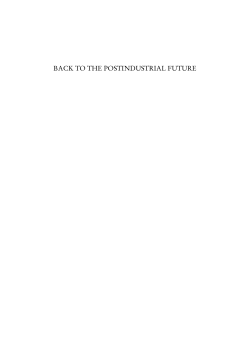
Additional Information
Book Details
Abstract
How does an urban community come to terms with the loss of its future? The former socialist model city of Hoyerswerda is an extreme case of a declining postindustrial city. Built to serve the GDR coal industry, it lost over half its population to outmigration after German reunification and the coal industry crisis, leading to the large-scale deconstruction of its cityscape. This book tells the story of its inhabitants, now forced to reconsider their futures. Building on recent theoretical work, it advances a new anthropological approach to time, allowing us to investigate the postindustrial era and the futures it has supposedly lost.
Felix Ringel is a COFUND International Research Fellow in the Anthropology Department at Durham University. His work on time, the future, and urban regeneration has been published in leading journals such as The Journal of the Royal Anthropological Institute, Critique of Anthropology and Anthropological Theory. He is co-editor of The Cambridge Journal of Anthropology’s issue on “Time-tricking: Reconsidering Temporal Agency in Troubled Times.”
“[Ringel’s] book masterfully captures the tension in Hoyerswerda residents’ lives as they navigate the interplay between their socialist pasts, their evolving postsocialist presents, and their potential postindustrial futures.” • EuropeNow
“Accessible and stimulating… There is little that I know of in our current literature that describes a present-moment European urban community in this ethnographic detail.” • Jane Guyer, Johns Hopkins University
Table of Contents
| Section Title | Page | Action | Price |
|---|---|---|---|
| Back to the Postindustrial Future | i | ||
| Contents | vii | ||
| List of Illustrations | viii | ||
| Preface | ix | ||
| Acknowledgements | xi | ||
| Notes on Translations | xiv | ||
| List of Abbreviations | xv | ||
| Introduction. Anthropology and the Future | 1 | ||
| Chapter 1. 'There Can Only Be One Narrative' | 33 | ||
| Chapter 2. Reasoning about the Past | 64 | ||
| Chapter 3. 'Hoyerswerda…?' – '…Once Had a Future!' | 90 | ||
| Chapter 4. Enforced Futurism/Prescribed Hopes | 118 | ||
| Chapter 5. Performing the Future | 146 | ||
| Conclusion | 173 | ||
| Bibliography | 195 | ||
| Index | 207 |
